When you right click on a Delphi form you get the popup context menu. The bottom option is Text DFM. This option can either be checked or not checked. What does it mean when this option is checked or unchecked?

When you right click on a Delphi form you get the popup context menu. The bottom option is Text DFM. This option can either be checked or not checked. What does it mean when this option is checked or unchecked?

This option is used to select the format used to save your form (in binary or text format).
If you use the text DFM option, the form (dfm file) will be stored in a text format like so
object Form1: TForm1
Left = 451
Top = 290
Caption = 'Form38'
ClientHeight = 300
ClientWidth = 635
Color = clBtnFace
Font.Charset = DEFAULT_CHARSET
Font.Color = clWindowText
Font.Height = -11
Font.Name = 'Tahoma'
Font.Style = []
OldCreateOrder = False
PixelsPerInch = 96
TextHeight = 13
end